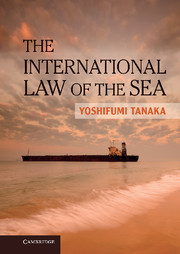Book contents
- Frontmatter
- Contents
- Preface
- Acknowledgements
- Figures
- Tables
- Abbreviations
- Table of Cases
- Table of Treaties and Instruments
- Part I The Divided Oceans: International Law Governing Jurisdictional Zones
- Part II Our Common Ocean: Protection of Community Interests at Sea
- 7 Conservation of Marine Living Resources
- 8 Protection of the Marine Environment
- 9 Conservation of Marine Biological Diversity
- 10 Marine Scientific Research
- 11 Maintenance of International Peace and Security at Sea
- 12 Land-Locked and Geographically Disadvantaged States
- 13 Peaceful Settlement of International Disputes
- Index
- References
13 - Peaceful Settlement of International Disputes
Main Issues
from Part II - Our Common Ocean: Protection of Community Interests at Sea
- Frontmatter
- Contents
- Preface
- Acknowledgements
- Figures
- Tables
- Abbreviations
- Table of Cases
- Table of Treaties and Instruments
- Part I The Divided Oceans: International Law Governing Jurisdictional Zones
- Part II Our Common Ocean: Protection of Community Interests at Sea
- 7 Conservation of Marine Living Resources
- 8 Protection of the Marine Environment
- 9 Conservation of Marine Biological Diversity
- 10 Marine Scientific Research
- 11 Maintenance of International Peace and Security at Sea
- 12 Land-Locked and Geographically Disadvantaged States
- 13 Peaceful Settlement of International Disputes
- Index
- References
Summary
Peaceful settlement of international disputes occupies an important place in international law in general and the law of the sea is no exception. In this respect, the LOSC establishes a unique mechanism combining the voluntary and compulsory procedures for dispute settlement. It is particularly significant that the LOSC sets out the compulsory dispute settlement procedures as an integrated part of the Convention. Furthermore, it is of particular interest to note that a new permanent international tribunal, namely, the International Tribunal for the Law of the Sea (ITLOS), was established. The dispute settlement procedures of the LOSC provide an interesting insight into the development of dispute settlement in international law. Thus this chapter will address the dispute settlement procedures under the Convention with particular reference to the following issues:
What are the principal features of the dispute settlement procedures of the LOSC?
What is the significance of and limitations associated with the compulsory procedures for dispute settlement under the LOSC?
What is ITLOS, and what is the role of the variety of chambers?
What is the role of ITLOS in the development of the law of the sea?
Does the establishment of ITLOS create a risk of fragmentation of international law?
Introduction
Since rules of international law, customary or conventional, are interpreted and applied by States individually (auto-interpretation/auto-application), it is not uncommon that the same rule may be interpreted and applied differently by different States. Experience demonstrates that different interpretations of a rule may become a source of international disputes. Hence it can be argued that the efficacy of rules of international law relies essentially on the existence of an effective mechanism of international dispute settlement, and this is particularly true of the LOSC. Indeed, as many provisions of the LOSC represent a complex balance of the interests of various actors, they are not free from uncertainty in their interpretation and application. Accordingly, the establishment of mechanisms for international dispute settlement is crucial with a view to ensuring the stability and integrity of the Convention. In response, the LOSC establishes unique procedures for international dispute settlement. Such procedures have at least four principal features which merit particular attention.
- Type
- Chapter
- Information
- The International Law of the Sea , pp. 390 - 423Publisher: Cambridge University PressPrint publication year: 2012



